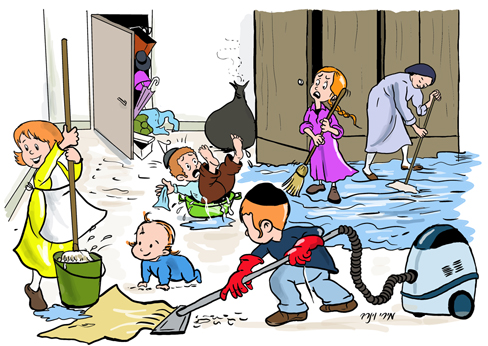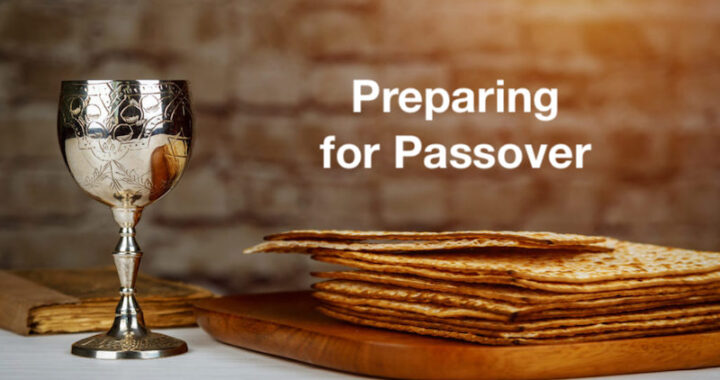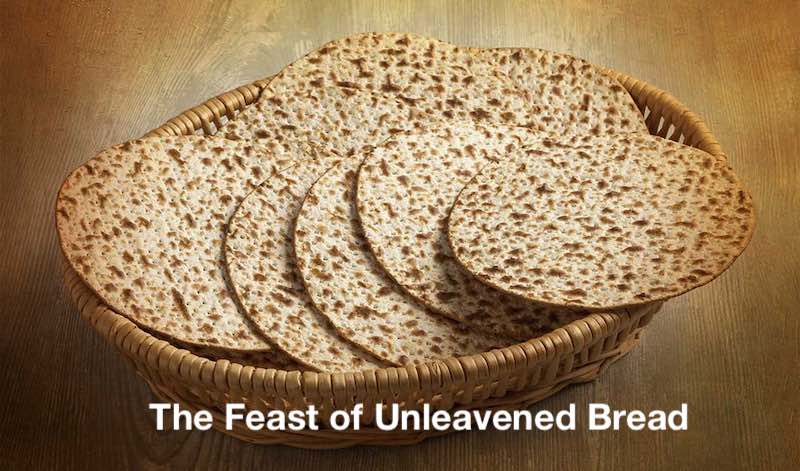How does one prepare for Passover?
Passover, like the Sabbath, is one of the seven Appointed Times of the LORD (Lev. 23). In the Jewish culture, each week revolves around the Sabbath. Both physical and spiritual preparations are made during the six days leading up to the Sabbath, the Sabbath is observed and celebrated, and then the new week begins again. In a similar manner, the same could be said of the annual celebration of Passover, however, the yearly observation of Passover is a bit more complicated.
The First Passover
The first Passover occurred in Egypt while the Israelites were still under the authority of the Pharaoh. It was the LORD who set the date for the first Passover. In fact, it was the LORD Himself who designated the month of Passover as the first month of the year:
Now the LORD said to Moses and Aaron in the land of Egypt, “This month shall be the beginning of months for you; it is to be the first month of the year to you. Speak to all the congregation of Israel, saying, ‘On the tenth of this month they are each one to take a lamb for themselves, according to their fathers’ households, a lamb for each household….’” – Ex. 12:1-3
It was as if the event of Passover set the biblical calendar into motion. The yearly cycle of the lunar calendar was reset by the month in which Passover was to be observed. Even though Passover did not officially begin until the middle of the month, the lamb was to be chosen on the tenth day of the month and kept until the end of the 14th day when the lamb was to be sacrificed in the evening (Ex. 12:6).
The Biblical New Year
It is the annual observation of Passover which fills the first month of the year on the biblical calendar. Today we call this first month Nisan, however, the original name for this first month is Aviv, as we read in the book of Deuteronomy:
Observe the month of Aviv and celebrate the Passover to the LORD your God, for in the month of Aviv the LORD your God brought you out of Egypt by night. – Deut. 16:1
The month of Aviv is marked by the Passover celebration and is to be a continual reminder of the great redemption of the Israelites by the power of God. To read more about the month of Aviv, click this link: The Month of New Life
The Feast of Unleavened Bread
The Festival of Passover is uniquely combined with another biblical celebration called The Feast of Unleavened Bread, which is celebrated for a full week:
Seven days you shall eat unleavened bread, but on the first day you shall remove leaven from your houses; for whoever eats anything leavened from the first day until the seventh day, that person shall be cut off from Israel. – Ex. 12:15
This seven-day festival of eating unleavened bread demands further preparations of removing all leavened items from one’s dwellings.
Although the instructions in the verse above speak of removing all leavened items from homes from the first day until the seventh day, the reality of this command is that no leavened items are to be in one’s home for the duration of this seven-day feast. Until today, the meticulous cleaning of one’s home in order to remove any trace of leavened items begins from the very beginning of this month, at least two weeks before the observation of Passover and the Feast of Unleavened Bread. To learn more about the Feast of Unleavened Bread, click this link: Feast of Unleavened Bread
Spring Cleaning
This year, the month of Nisan (Aviv) begins on Sunday, March 14, 2021 with the first day of Passover falling on Sunday, March 28, 2021. From the first day of this month, if not before, the Jewish tradition is to vacuum, sweep, and dust every square millimeter of one’s home to purify it from any trace of leaven. We need to give God the credit for the concept of “spring cleaning!”

Spiritual Spring Cleaning
Beyond the physical preparations of choosing the lamb on the tenth of the first month and cleaning out the leaven from one’s home, there are also spiritual preparations for Passover. We read in the book of Ezekiel how the Temple itself was to be spiritually cleansed in preparation for the Passover:
This is what the Lord GOD says: “In the first month, on the first of the month, you shall take a bull without blemish and cleanse the sanctuary from sin. And the priest shall take some of the blood from the sin offering and put it on the door posts of the house, on the four corners of the ledge of the altar, and on the posts of the gate of the inner courtyard. And you shall do this on the seventh day of the month for everyone who does wrong inadvertently or is naive; so you shall make atonement for the house. In the first month, on the fourteenth day of the month, you shall have the Passover, a feast of seven days; unleavened bread shall be eaten…” – Ezekiel 45:18-21
A sin offering was to be offered with its blood applied to the door posts of the Temple (“the house”). Then another sacrifice was to be offered on the seventh day of the month for those who sinned unintentionally in order to cleanse the Temple from the sin of the people. The Temple was to be ritually cleansed in preparation for Passover during the first seven days of the month Nisan.
Personal Purification
On top of these preparations, there is also the expectation of personal cleansing of the individual. In the New Testament, we read how the Jewish people journeyed to Jerusalem in order to prepare themselves for the Passover:
Now the Passover of the Jews was near, and many went up to Jerusalem from the country prior to the Passover, in order to purify themselves. – John 11:55
Passover is one of the three mandatory feasts that the Israelites were required to observe at the appointed place which the LORD would choose (Deut. 16:16). After the people settled in the Land, the LORD chose Jerusalem as that appointed place. As we read in the gospel of John above, the people purified themselves in preparation for observing the Passover in Jerusalem.
This personal purification for Passover would most likely include ceremonial cleansing in a Mikveh: a pool of fresh water in which one immerses oneself. This is not considered bathing but a spiritual act of starting afresh with God. Spiritual immersion in a Mikveh is equated with going back to creation and being spiritually cleansed from every impurity (Lau, Rabbi Israel Meir. Practical Judaism. p. 381). The Christian observance of water baptism is derived from this Jewish observation in the Mikveh, a type of spiritual cleansing. After all of the physical and spiritual preparations were completed, the people would be ready to observe the Feast of Passover.
Should we observe Passover today?

Passover Fulfilled
The New Testament clearly teaches that Yeshua became the Passover Lamb and that He was sacrificed on the day of Passover. All four gospels in the New Testament attest to this fact. We also read how the Messiah fulfilled the Passover and how we are to understand it today in the first letter to the Corinthians:
Clean out the old leaven so that you may be a new lump, just as you are in fact unleavened. For Messiah our Passover also has been sacrificed. Therefore let us celebrate the feast, not with old leaven, nor with the leaven of malice and wickedness, but with the unleavened bread of sincerity and truth. – 1 Corinthians 5:7-8
The context of these verses is not particularly focused on how to celebrate the biblical feast of Passover, but rather, how to live a holy life in light of what the Messiah has done for us by becoming the Passover lamb.
Observing a traditional Passover Seder today with Yeshua as the focus is an excellent reminder of how God redeemed the Israelites from the slavery of Egypt and of how He redeems us today from the slavery of sin by the blood of the Lamb. Rather than asking the question of whether or not we should observe the Passover today, why not take the opportunity to observe this biblically Appointed Time in order to reflect afresh on the fulness of God’s great redemption for mankind?
How do we prepare for Passover today?
The physical preparations for Passover are an excellent reminder of what it means to live a life free from the influence of sin. Leaven or yeast are often used in the Bible to symbolize sin as we read in 1 Corinthians 5:7-8. Just as all of the leavened items are to be removed from one’s home in preparation for observing the Passover, so we should remove the leaven of sin from our lives. Although Passover is only observed one week out of the year, the removal of sin from our lives requires more frequent attention. The yearly practice of spring cleaning and purifying the home from leaven helps us see the importance of continually purifying ourselves as we seek to live a life free from sin!
Preparing for Passover
Just as the Israelites experienced the Passover for the first time 3500 years ago but then celebrated Passover year after year in order to remember what God had done for them, so we too have the opportunity today to observe the Passover each year in order to remember the great salvation that God has provided for us through Yeshua’s sacrifice. Obviously, the practice and observance of taking communion as a believing community is a periodic reminder of the fulness of the Messiah in Passover, however, the yearly Passover experience is a great reminder of all of the details of this event. In preparation for the yearly observance of Passover, let us take the time to examine our lives afresh and clean out the leaven of sin as we wait expectantly for the appearing of our Messiah!
Shabbat Shalom!
Help keep our weekly commentaries free and available to all by giving today.
If you enjoyed reading this article, share it today with friends! We also invite you to sign up for our weekly Torah Portion commentary on the sidebar to the right.
*All Scripture take from NASB Copyright © 1960, 1962, 1963, 1968, 1971, 1972, 1973, 1975, 1977, 1995 by The Lockman Foundation
**The Hebrew name “Yeshua” is used in the biblical quotations in place of the English name “Jesus” to give emphasis to the meaning of this name, salvation. The word “Messiah” is also used in place of the word “Christ” to bring clarity to the office of Yeshua.




Dear Daniel, thanks again for your spiritual input. Does the Mikveh have a biblical foundation or is it just Jewish tradition. And what`s the origin of it. Thanks for your reply.
All the best, Daniel and Sara
This is a good question. I address this subject to some extent in my book on the Third Temple. The concept of Mikveh, cleansing with water, is certainly biblical and it developed over time to what it was in the days of Yeshua and how it is still part of Judaism today. I don’t have the time or space to give a full teaching on this here but it is a good subject that I will consider writing more about in the future. I hope this helps.
Thank you Daniel. I always enjoy what you write. They are refreshing in the spirit. Blessings Trish
My pleasure. I appreciate the feedback Trish!